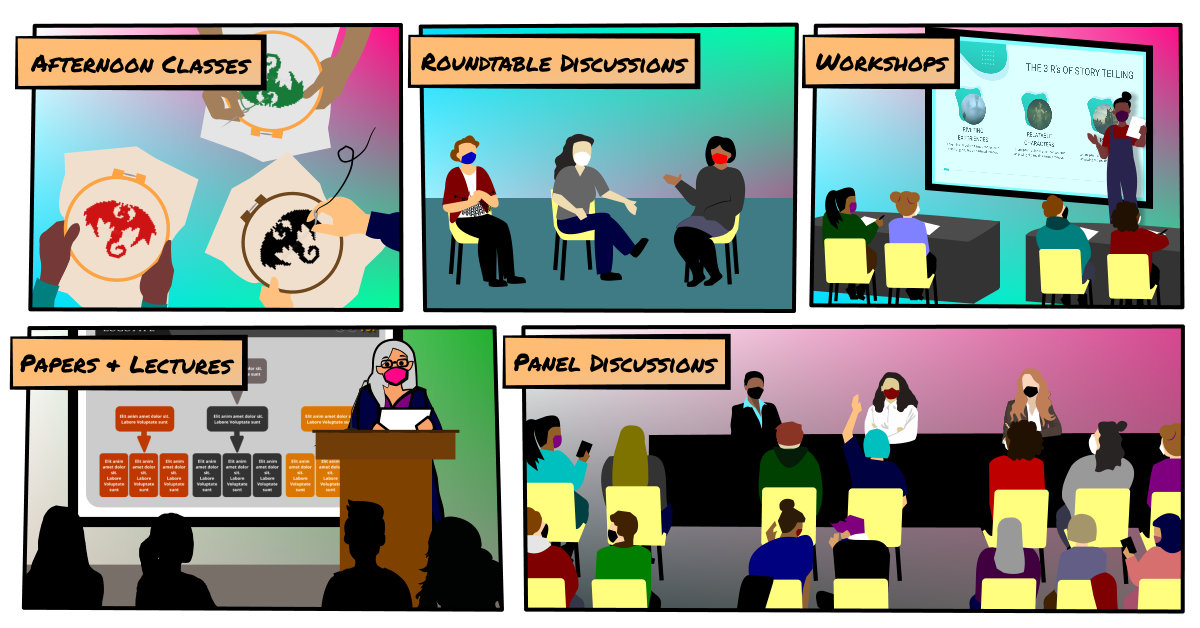
After a very unusual year, in which we transformed Sirens into an online gathering, we are again planning for an in-person event this fall. We are readying the programming schedule, collecting newly released books, searching for amazing auction items, and discussing how we can make Sirens—after a year away—feel as warm and welcoming as ever. We confess: This all feels a bit strange.
And we suspect that coming—or coming back—to Sirens might feel a bit strange to you, too. So we thought we’d offer a series of posts about what Sirens is (or isn’t), some travel tips and tricks, and how you might choose to engage with the conference and community. If you’re planning on attending, we can’t wait to see you. And if you’re returning, we can’t wait to see you again.
Here are the first five posts in our Siren’s Voyage series, about whether Sirens might be the right conference for you, making travel arrangements, what to pack, pandemic protocols, and joining the community. This week, let’s talk about navigating the Sirens programming schedule.
Sirens Conference: Programming Philosophy
Sirens is, at its heart, a series of conversations. And each year, the vanguard of those conversations are the brave and brilliant individuals—readers, scholars, librarians, educators, publishing professionals, authors, and more—who share their thoughts and wisdom as part of our programming.
Unlike many conferences, Sirens does not assemble its own programming. Instead, we invite our attendees—all of our attendees, regardless of vocation, level of experience, or years at Sirens—to propose the papers, lectures, panels, roundtable discussions, workshops, and afternoon classes that make up our programming. That means that every year our programming schedule reflects what the impressively accomplished Sirens community is working on, thinking through, interrogating—and finds important.
With a small number of exceptions, the programming that you’ll attend at Sirens was proposed by attendees and reviewed and selected by our independent vetting board, which represents experience and achievement in the various areas in which we receive a majority of our proposals. This is a rigorous process, demanding thoughtfulness, scholarship, relevance—and courage! We hope you’ll take the time to both attend programming this weekend and thank the presenters for their work.
We also hope you’ll remember that Sirens is deliberately interdisciplinary in its approach. At Sirens, readers present alongside librarians, educators and booksellers collaborate on course curricula, and authors learn from scholars. We think that our method of programming selection highlights the importance of this interdisciplinary discussion and helps ensure that our programming represents the true breadth of diverse perspectives, experiences, and identities of the Sirens community.
Sirens Conference: Types of Presentations
When we created Sirens, we did so with an active experience in mind. That means that, unlike many conferences you may know, our programming is not always a passive listening experience, perhaps with an opportunity to ask a question or two. Some of our programming takes that format, but other presentations will rely on audience discussion or engagement, and we’re sure you’ll want to know which is which before you attend.
You may notice that each presentation at Sirens is classified as a paper/lecture, panel discussion, roundtable discussion, workshop, or afternoon class. This gives you some idea of what the presentation format will be—and how involved you, the audience, will be expected to be. Here are the most common types of presentations, including what the presenter will be seeking in terms of audience participation.
Papers and Lectures
Presenters may read papers or deliver lectures or talks on a topic and may or may not take audience questions during or after the presentation. Occasionally, papers and lectures will be delivered as a pre-empaneled set of presentations on related topics. These presentations are meant to be largely informational and often have a rather passive audience experience.
Panel Discussions
Panels, led by a moderator, generally discuss and debate a topic before an audience and may or may not take audience questions during or after the discussion. While these presentations include a number of presenters discussing a topic, like papers and lectures, they tend to have a rather passive audience experience.
Roundtable Discussions
Roundtable discussions are limited to a smaller audience—typically, one that reflects the discussion section that would be paired with a college lecture course—and depend on audience participation. These sessions will be led by a moderator seeking to explore open-ended questions with the audience and who will encourage everyone attending to take part. Seating in these presentations is limited to allow for a discussion that includes all attendees.
Workshops
Workshop sessions are led by an instructor and focus on the application and practice of a skill. Generally, attendees should expect to get their hands dirty, at least figuratively. The opportunity for the audience to gain or expand upon a particular skill, including the opportunity for participation or leaving with material for later use, marks this style of presentation. Seating in these presentations is limited to allow for hands-on instruction.
Afternoon Classes
Afternoon classes are an opportunity for instruction or exploration of practical topics related to fantasy literature, such as historical dress or music, martial arts, weaponry, battle strategy, costume construction, and so forth. Afternoon classes may be less formal than other types of programming in their presentation. Afternoon classes may be similar to workshops or be more demonstration-based, depending on the topic.
Please note that we have not yet released a programming schedule for Sirens, as we would normally have done by now, due to the number of shifting pandemic issues. We will have that schedule available for you at the conference itself.
Nevertheless, we hope that you’ll attend many presentations at Sirens. This is the core of both the conference itself and the conference’s educational mission, and we think you’ll find that the opportunities to both learn from and engage with other Sirens attendees are extraordinary and not to be missed.







Connect with the Sirens community
Sign up for the Sirens newsletter